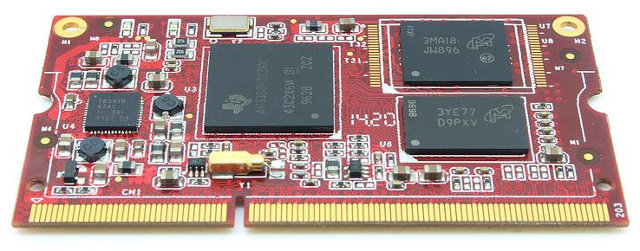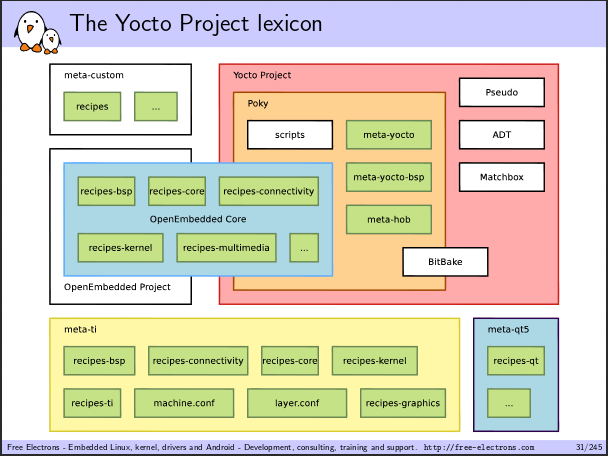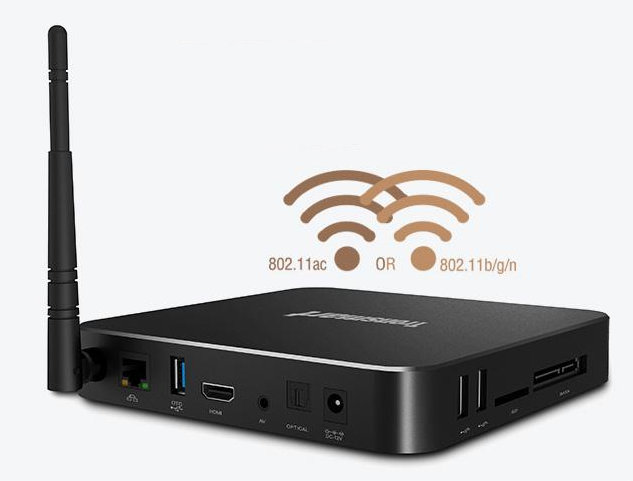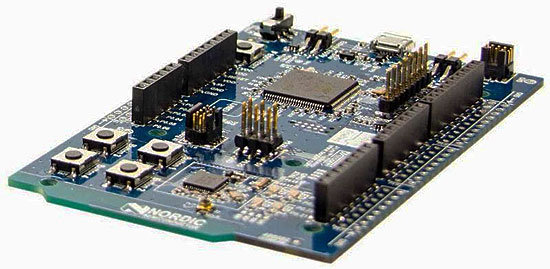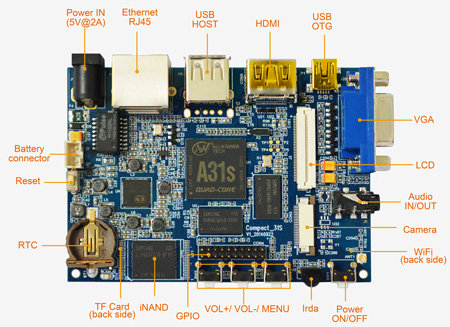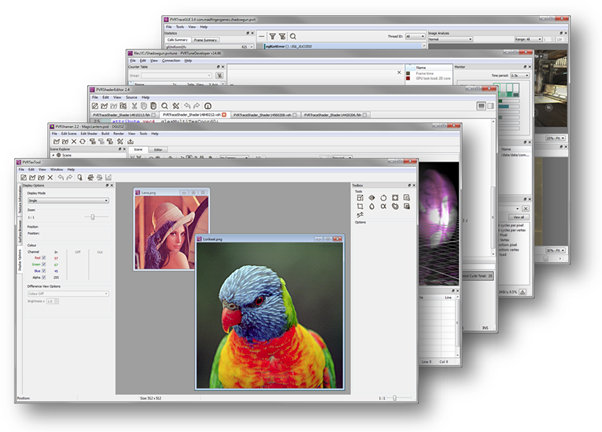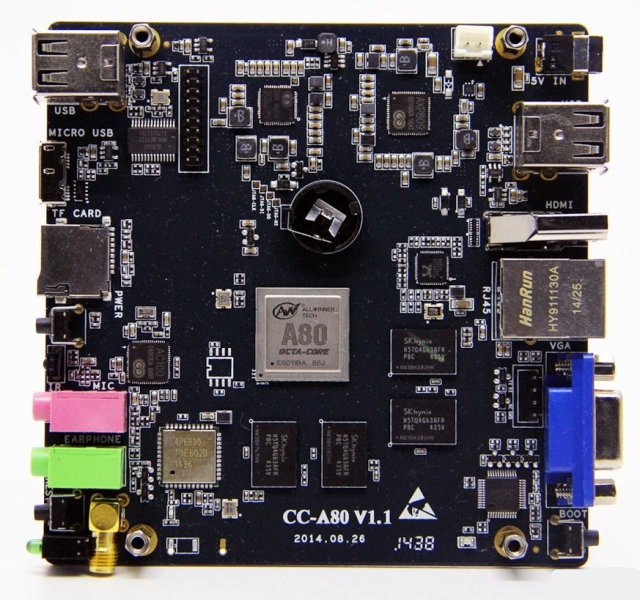GOEMBED is a startup funded by engineers previously working for Embest Shenzhen, based in Longhua district in Shenzhen, and specialized in embedded boards and modules. They currently have board and modules based on Freescale i.MX6 and Texas Instruments Sitara processors, but I’ll focus on the TI products in this post, including one of their single board computers that supports BeagleBone capes. CM3352 and CM3358 Systems-on-Module CM335x Series modules specifications: SoC – Texas Instruments Sitara Cortex A8 AM3352 @ 800 Mhz or AM3358 @ 1.0 GHz System Memory – 512 MB Micron DDR3 chip Storage – 2 to 4 GB eMMC depending on model PMU – TI TPS65910A3 Dimensions – 67.5 x 36.5 mm Temperature Range – Commercial: 0° to 70° C or Industrial: -40° to 85° C The modules are said to support Linux 3.x, Android 4.x, Ubuntu, Angstrom, Debian, WinCE 6.0/7.0, and uCOS operating systems. SBC335x Single Board Computers […]
Android 5.0 Lollipop Source Code Pushed to AOSP
As Nexus 6 smartphone, Nexus 6 tablet, and Nexus Player have now started to ship, Google has pushed Android Lollipop to AOSP (Android Open Source Project), as well as images for Nexus 4, Nexus 5, Nexus 7 (2012 and 2013), and Nexus 10. You’ll soon be able to retrieve the source code with the following command lines [Update: I still can’t use the lollipop-release branch to retrieve the code, so instead you can use android-5.0.0_r1 tag for Nexus 9, or android-5.0.0_r2 tag for Nexus Player / Android TV]: repo init -u https://android.googlesource.com/platform/manifest -b android-5.0.0_r1 repo sync Currently repo init fails with: error: in init -u https://android.googlesource.com/platform/manifest -b lollipop-release –repo-url=https://gerrit.googlesource.com/git-repo –repo-branch=stable: revision lollipop-release in manifests not found But everything should come online soon. In the meantime, you could still browse the code. Anyway that means Android 5.0 images for mini PCs, TV boxes and other devices will hopefully be available in […]
Free Electrons Publishes Yocto & OpenEmbedded Training Materials
Free Electrons is a small (9 people) engineering company focusing on embedded Linux / Android, and open source software, which also happens to have ported several ARM SoC to the mainline kernel. From time to time, they also offer training sessions, and release course materials publicly. Their latest training is a 3-day course dealing with the Yocto Project and OpenEmbedded, using BeagbleBone Black development board for lab sessions, and all materials have been released under a Creative Commons license. The training consists in: Understanding the Yocto Project Using it to build a root filesystem and run it on your target Writing and extending recipes Creating layers Integrating your board in a BSP Creating custom images Application development with an Eclipse SDK Three files are released: yocto-slides.pdf – Yocto Project and OpenEmbedded Training presentation slides (245 pages) give an overview of various build systems, before getting more details about the Yocto […]
Tronsmart Draco AW80 is an Allwinner A80 Android mini PC with Up to 4GB RAM
An Allwinner A80 board for TV boxes / mini PC started to show up in the upcoming Z8C Alice TV box a few weeks ago, and the board, or another one with exactly the same layout, made it into Tronsmart Draco AW80 Meta and Telos mini PCs with respectively 2GB RAM/16GB eMMC, and 4GB RAM/32GB eMMC, and selling for $149.99 and $199.99 on GeekBuying. Tronsmart Draco AW80 Meta/Telos specifications: SoC – AllWinner Ultra Core A80 4x Cortex 15, 4x Cortex A7 big.LITTLE processor with Imagination Technologies PowerVR GC6230 GPU with support for OpenGL ES 1.1/2.0/3.0, Directx 9.3 System Memory – 2GB (Meta), or 4GB (Telos) DDR3 Storage – 16 GB (Meta) or 32GB (Telos) eMMC + SD card slot + SATA port (via a USB 2.0/3.0 bridge) Video Output – HDMI 1.4b + AV port Audio – HDMI, AV, and optical S/PDIF (Main) Video Codecs – H.265/VP9 up to 1080p […]
Nordic Semi Announces nRF51 DK Arduino Compatible Board, and nRF51 Dongle with Bluetooth Smart, ANT, and 2.4GHz Connectivity
Nordic Semiconductor has introduced two new low cost development boards supporting Bluetooh LE, ANT/ANT+, and proprietary 2.4GHz applications based on their nRF51 series SoCs: nRF51 DK, an Arduino UNO Rev.3 compatible board that can be used for various IoT and wearables applications, and nRF51 Dongle, a USB dongle to connect to a PC or board, which can be useful for packet sniffing and BLE peer connection. nRF51 DK Development Board Key features listed for the board: SoC – Supports nRF51822 (BT/2.4Ghz) and nRF51422 (BT/ANT) SoCs based on an ARM Cortex M0 processor, with 128kB or 256kB flash memory, and 16kB or 32kB RAM. Connectivity Bluetooth Smart, ANT/ANT+ and 2.4GHz proprietary Integrated PCB antenna Connector for RF measurements Expansions Headers Arduino Uno Rev. 3 compatible connector for use with 3rd party shields All I/O and interfaces available via connectors Debugging Segger J-Link OB and ARM CMSIS-DAP Program/Debug supported Support for Program/Debug […]
Boardcon Compact 31S is an Allwinner A31s based Development Board with HDMI, VGA, and LCD Interfaces
Boardcon Embedded Design, an ODM providing industrial Computer-on-Module, and board, announced Compact A31S powered by Allwinner A31s quad core Cortex A7 processor, with 2GB RAM, 4GB eMMC, HDMI, LCD and VGA video outputs, and various other ports. Boardcon Compact A31s hardware specifications: SoC – Allwinner A31s quad core ARM Cortex-A7 @ 1 GHz with 256 KB L1 cache, 1MB L2 cache, and PowerVR SGX544MP2 GPU compliant with OpenGL ES 2.0, OpenCL 1.x, DX 9_3 System Memory – 2GB DDR3 @ 1866MHz Storage – 4GB eMMC Flash + micro SD slot Video Output – HDMI 1.4, VGA (up to 1280×800), and 40-pin FPC connector for LCD with capacitive touch screen support Audio Output – HDMI, 3.5mm headphone jack Connectivity – 10/100M/1000M Ethernet, Wi-Fi USB – 1x USB 2.0 host port, 1x USB 2.0 OTG port Camera – CMOS Camera interface Expansion – 1x 20-pin expansion connector for GPIOs Misc – Real Time […]
PowerVR SDK v3.4 Supports WebGL, 64-Bit Android 5.0 Lollipop, and MIPS Linux
Imagination Technolgies has just released PowerVR SDK v3.4 including the latest compilers for PowerVR Series6 and Series6XT GPUs to PVRShaderEditor, several performance optimization, a new WebGL SDK, 64-bit support for Android 5.0 Lollipop, and Linux support for MIPS based processors. The company has revamped the user interfaces of their tools, and made the following key changes: PVRTrace, a tool to capture and analyze OpenGL ES and EGL API calls, now supports OpenGL ES 3.1, compressed trace files, and they’ve reduce the software memory usage PVRTune, a performance analysis tool, now features new counters, and “significant” performance optimizations. PVRShaderEditor, a light-weight shader editing too, adds the latest compilers for PowerVR Series6 (FP32 and FP16) and Series6XT GPUs, as well as GLSL disassembler output. PVRTexTool, a utility for compressing textures, adds plugin support for Autodesk 3DSMax and Maya (2015 versions), and improves ETC decompression by up to 20% faster per surface. Imagination also […]
AllWinner A80 based Cubieboard4 Development Board is Now Available for $100 (in China)
Allwinner and Cubietech announced they were working on Cubieboard8 in May, before we got to see some pictures of the first engineering samples. Cubieboard8 has now been renamed to Cubieboard4, also known as CC-A80 (CubieTech single board Computer A80), and the company has listed the board on Taobao for 620 RMB (~$102), with shipping scheduled for October 30. Cubietech CC-A80 board specifications, which have changed since the first pictures were released in July: SoC – AllWinner A80 octa core 4x Cortex A15 @ 2.0GHz, 4x Cortex A7 @ 1.3GHz, and Imagination PowerVR G6200 GPU System Memory – 2GB DDR3 Storage – 8GB eMMC (25MB/s read and write speed), micro SD Card slot Video Output – HDMI 1.4, and VGA Audio I/O – HDMI, 2x 3.5mm audio jacks for audio output and microphone Connectivity – Gigabit Ethernet, dual band Wi-Fi 802.11 b/g/n up to 300 Mbps + Bluetooth 4.0 (AP6330 module) […]


